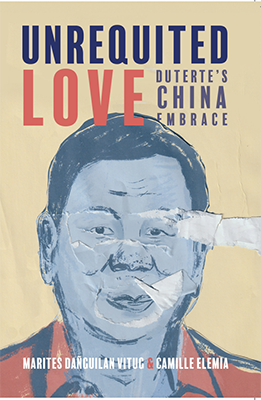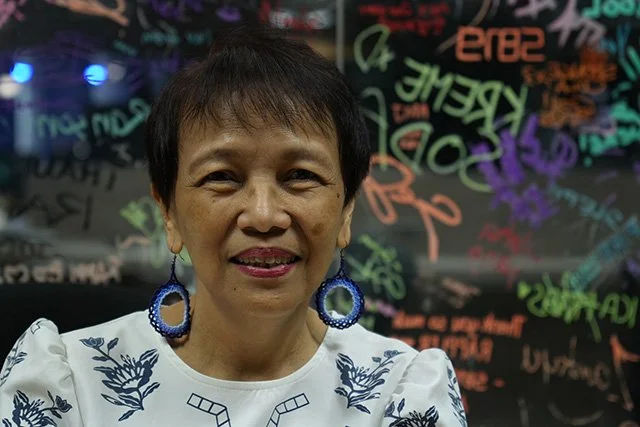China and Duterte: ‘Who’s Your Daddy?’
Book Review: Unrequited Love: Duterte’s China Embrace, by Marites D. Vitug and Camille Elemia. Quezon City. Ateneo de Manila University Press. 2024, xviii, 309 pp.

Marites D. Vitug and Camille Elemia’s book, Unrequited Love: Duterte’s China Embrace
Both were lies.
Criselda Yabes writes in her book The Battle of Marawi that it was an SR-25 sniper rifle lent by an American special forces unit that killed Hapnilon and other ISIS leaders. The Americans has continually updated the AFP’s military stocks since the two countries renewed joint military exercises in 2000.
The AFP did accept the Chinese rifles, only to turn most of them to the Philippine National Police because these were not fit for its primarily American arsenal. The only other government force to use the guns was the Presidential Security Group.
At the turnover ceremonies, the “Department of National Defense [DND] used the logo of Taiwan’s Ministry of Defense, instead of the People’s Republic of China’s, in the program’s huge banners.” The DND apologized later, but those watching the turnover saw the mischievous prank at play. A friend mused: “Mukhang gawang Greenhills yong mga riple, kaya ni-reject ng AFP! (Looks like the rifles were Greenhills-made)” [Greenhills Shopping Center in San Juan once had stalls that built computers from scratch whose operability was considered suspicious].
Authors Marites Vitug and Camille Elemia include these stories in this remarkable book to remind us that it was not all smooth sailing for Duterte’s pro-Beijing leanings. The fiercely pro-American AFP officer, the clumsy bureaucrat, and the American-trained technocrat formed the first line of defense inside the government to stop or slow down the President’s barefaced kowtowing to China’s interests.

Marites Vitug
The Picaro Platitudinarian
The Patsy worked hard to get the Pasha’s attention, flattering him by cursing at the “damn Americans” and giving the European Union the dirty finger. He declared his fealty to “Xi Winnie” (the Chinese’s impish nickname for the Pasha) and Vladimir Putin. He egged them to form a new confederation of nations after being repeatedly criticized by the United Nations High Commissioner on Human Rights.
He kept his Cabinet off the loop. Officials of the Duterte administration were dumbfounded when their boss decided to go all-China on his first state visit to Beijing, brought in Chinese anti-Covid vaccine, overruled military plans to keep the West Philippine Sea protected, and endorsed agreements with Chinese companies, creditors, and investors. Duterte was the only president with a Chinese citizen – Michael Yang – in his inner economic circle. He spent more time with the Chinese ambassador than his ambassador to the United States and the United Nations.
He was willing to break the law and gamble with the Filipinos’ lives, bringing in Sinnovac and Sinopharm even if the World Health Organization had not yet approved these anti-Covid vaccines and the Department of Health was doubtful of Chinese test results. This was technical smuggling writ large, made more despicable since the first guinea pigs of these dubious drugs were the Presidential Security Group.
He gave the Pharmally group monopoly over the supply of COVID equipment, citing a national emergency for not following government contract procedures. Until it was caught, executives of the Chinese-owned company had a field day overpricing their products. In the meantime, the DOH took its sweet time approving the more effective Pfizer and Moderna vaccines.
There were more lapdog moments during the pandemic. The Philippines was one of the first to donate medical protective equipment to Hubei province, which was the outbreak's epicenter, “despite the lack of medical supplies in the Philippines.” When it was China’s turn to donate the same, the DOH discarded the test kits “because they were only 40 percent accurate in diagnosing COVID-19.” The Chinese embassy vehemently protested, calling the DOH’s remarks “irresponsible.” Francisco Duque, the health secretary, “had to swallow its words and apologize.”
The first Covid death in Asia outside China was in Manila on February 2, 2020.

Camille Elemia
The Pandering Potentate
Xi Winnie was an expert at flattery. When Donald Trump visited China, Xi disarmed the bellicose US president by massaging his ego with substantial military parades and sumptuous official banquets. He would do the same with his client Duterte, showering him with attention during state visits or international conferences.
The promise of considerable aid followed. Professor Alvin Camba notes how Pasha and Patsy share this “tendency to overhype deals or projects.” True enough, of the US$24 billion development pledge Xi Winnie promised Duterte, the Philippines received a measly US$62.1 million in 2018. In his third year in office, three-fourths of infrastructure loans were provided by Japan, while China's share was a measly 19 percent. When Duterte left office, only three projects received Chinese funding: the Kaliwa Dam Project, the Chico River Pump Irrigation Project, and the bridge connecting Samal Island to Davao City.
In the larger scheme of things, Chinese “contributions” to Philippine economic development came at a very poor last. In 2021, there were 45 development aid projects came from Japan, 52 from the Asian Development Bank, 29 from the World Bank, and all of five from China! The aid reeked with corruption. The Chinese Communications Construction Corporation, which “won” the contracts for the Samal Bridge and the Binondo Bridge, was the same firm blacklisted by the United States for building illegal Chinese bases in the West Philippine Sea and debarred by the World Bank because of fraudulent practices.
Chinese loans had some of the highest interest rates among the Philippines' international debts, prompting senators to oppose their approval. Senators Richard Gordon and Risa Hontiveros successfully sank the “Safe Philippines” project, although at the cost of Gordon’s career.
Chinese aid smoothly went to the construction of a state-of-the-art surveillance system for Davao City, just in case the people turn against the patsy. Duterte tried to nationalize the “Davao Safe City” idea, with China promising US$33 million in aid. Duterte couldn’t care less about national security and said nothing when Huawei, the Chinese state communications company that handled the contract, declared that it “wants to know what you like to eat, where you want to go, to secure your safety.” Thanks to two lumbering bureaucracies and Covid, “Safe Philippines” ended not being implemented at all.
A “retired” Duterte decided to go to war against the Marcoses after they plotted to block his daughter’s path to the presidency. Giving Duterte a dose of his own medicine, they freed Leila De Lima and sent the police after his Son of God and pedophile BFF Apollo Quiboloy. Inday Sara had to give up her Department of Education cabinet post, and the Secretary of Justice is hinting at a future visit of prosecutors from the International Court of Justice. Finally, the House of Representatives has opened committee hearings on Operation Tokhang extrajudicial killings.
Bongbong Marcos has returned to the good graces of the Americans and welcomed visiting forces from Japan, Singapore, and Australia. He has shown uncanny patience while China shoots itself in the foot each time it harasses Filipinos in the West Philippine Sea.
Duterte spent more time with the Chinese ambassador than his ambassador to the United States and the United Nations.
The ailing Duterte has been lashing out, but no one seems to be listening. Not even Xi Winnie.
Unrequited Love attests to the talent and foresight of the country’s top investigative journalist and her colleague who once belonged to a cohort of young women correspondents at Rappler. Get it and be angry.
-
To buy a copy: Website: www.unipress.ateneo.edu
-
Shopee: go.ateneo.net/Shopee
-
Lazada: go.ateneo.net/Lazada
International distribution is still being arranged.

Patricio N. Abinales teaches Asian Studies at the University of Hawai'i-Manoa.
More articles from Patricio Abinales


No comments: